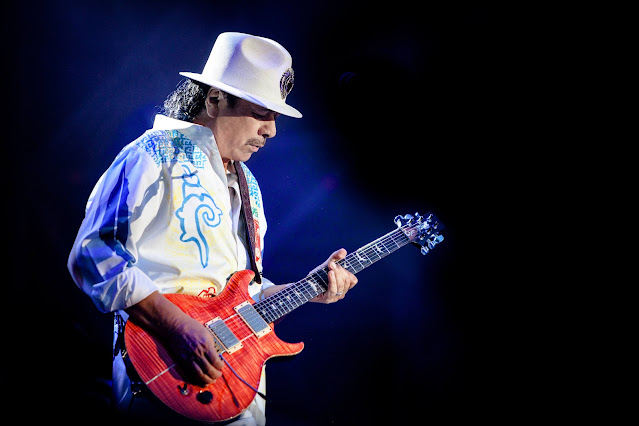Directed by Rudy Valdez
ChinoKino score: B-
Review by Allan Tong
Though directed by Rudy Valdez, Carlos is really Carlos Santana's film. The legendary Mexican-American guitarist authorized this (auto)biodoc and has stated he had final cut. He selected what parts of his extensive career he wished to reveal and conceal. The end result is a mixed bag, a documentary that's thrilling at times, plodding at others, though strung together by amazing music.
Santana tells his story first-hand, narrating to the viewer chronologically. The first 20 minutes are the film's most rewarding as his recalls growing up in Mexico under an mariachi musician father and loving mother who endured her spouse's affairs. His father ordered young Carlos him to study the violin and filled their house with native Mexican as well as classical music. Born in 1947, Carlos was seduced by the first wave of rock 'n' roll and blues which emanated from north of the border. This gifted musician blended these styles to forge his signature guitar sound that carried him to stardom once he moved to San Francisco, jumping into the hippie hotbed of that late-1960s scene.
Rock impressario, Bill Graham, is one of the few non-Santana voices given face time here. Rightfully, Graham deserves a place in this story, since he managed the early band by showcasing them extensively at his legendary Fillmore rock venue in San Francisco, then booked these unknowns to play before half a million kids at Woodstock.
Santana has told his Woodstock story many times, but it is a highlight in this film. He dropped acid (his bandmates have said mescaline) moments before taking the stage, and the neck of his guitar turned into a snake, but he tamed it with a blistering performance.
After recording three legendary albums, Santana cut loose his "classic band" due to internal strife and substance abuse, but Santana dismisses this murky period in a quick sentence. Blink and you miss it. What happened? In fact, Santana is rarely candid about any strife in his life. His father disapproved of rock music, but years later they patched things up.
Other voices include his sisters today, his wife, the superb drummer, Cindy Blackman, but they all present nice, lovey-dovey recollections. Was there any envy within the family? Since Carlos was sharing some of his wealth with his family, how did that alter family dynamics? Sorely missing are interviews with any of the dozens of bandmates Santana has employed over six decades, especially the band that rocked Woodstock which launched their careers. There's hardly anything said about recording those first three landmark albums which pushed Latin rhythms into the American mainstream. Why did he cover Peter Green's Black Magic Woman, which ironically became Santana's signature song? Nothing about his collaboration with Alice Coltrane. The film completely ignores the 1980s and 1990s, Santana's long draught, though offers detail on recording his 1999 global comeback album, Supernatural, including the smash hit, Smooth, with Rob Thomas of Matchbox Twenty. Instead, there's a lot of time devoted to Santana's spiritualism and how wonderful his two wives have been. Yes, those areas deserve a place in this film, but they highlight what's missing in this story, too.
Carlos is full of home movies, innocuous enough, and plenty of vintage clips though many have been seen over the years, notably in the 1988 VHS/DVD documentary, Vina Santana! (which feels like a forerunner of this documentary). This footage and music enlivens slower spots in the film.
Overall, csual fans will enjoy Carlos for offering an FAQ of Santana's career, but hardcore fans like me will walk away disappointed, knowing that this is a sanitized, incomplete portrait.
Carlos will be released across Canada on Sept. 29 by Mongrel Media.

